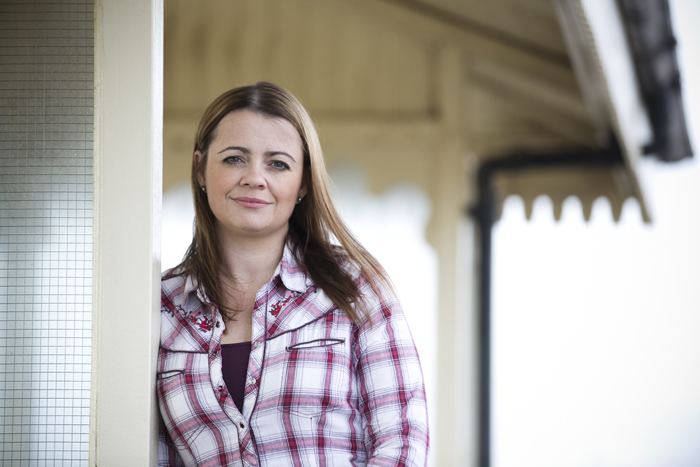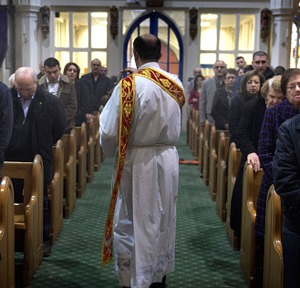
This article is a preview from the Autumn 2014 edition of New Humanist. You can find out more and subscribe here.
Carys Bray was born into a strict Mormon family in Southport, Merseyside. She left the church in 1999. In 2012, she won the Scott Prize for her debut story collection Sweet Home. Her keenly anticipated first novel, A Song For Issy Bradley, tells the story of a Mormon family struggling to come to terms with the death of their youngest daughter, Issy.
Your novel deals with issues – religion, bereavement, family – that have played a big part in your own life. Was this the book you’d been waiting to write?
When I started writing short stories I deliberately didn’t write about anything to do with religion. That was a conscious choice. I wasn’t sure how to even approach it. But by the time I’d written Sweet Home I was ready to have a go, and I knew too that if I was ever going to write a book with Mormon characters it would probably be best to do it sooner rather than later, while it was fresh in my mind.
You’ve said that you “replaced religion with writing”. How literally should we take that?
I found this quote by Virginia Woolf the other day: “If you do not tell the truth about yourself you cannot tell it about other people.” I think that was the case for me. Until I could be honest about my doubts and how I really felt, I just couldn’t write. I started writing around the time when I “came out” as an unbeliever, so the two coincided.
Ian, the father of the Bradley family, seems to have very few doubts about his faith. Did that make him a difficult character to write?
It was difficult to make him sympathetic – I had to tone him down a bit. But actually Ian’s the character who is most like me when I was a Mormon. Everyone thinks that [Ian’s wife] Claire is me, but no, I was like Ian. I was absolutely certain, and determined not to question, just to
accept things. I was like that for a long time, so I know how it feels to be brimming with certainty. But obviously I also understand how it feels to doubt.
The novel seems to suggest that religion doesn’t have a mechanism for dealing with profound personal grief.
I think it’s valuable for some people. It’s a useful mechanism for containing grief. It’s like constructing a dam around the sadness to keep it in. But if you’re the sort of person who thinks a lot, there’s a danger that rather than building you’re beginning a process of deconstruction and then, when you’re taking things apart and examining them, there’s nothing to contain the grief.
Unless you actually hide, people are going to notice that you’re not being consoled, and then, in a faith like Mormonism where it’s very important to appear to be certain, maybe there is almost a shame in not being comforted.
Is doubt forbidden in Mormonism?
It’s very difficult, culturally, to doubt. There was a sermon given in 2009 with the title “The Six Destructive Ds”, and they were Doubt, Discouragement, Distraction, lack of Diligence, Disobedience and Disbelief. So doubt is equated with these really negative things. I found that it’s impossible to create something without doubt. All creative things begin in the dark. That’s where books begin, in a sense of doubt.
How much distance do you have from the faith?
I know it seems strange to outsiders. To me it’s like one of those pictures where there’s a woman and she seems both old and young, and if you blink you can make it switch. It’s like that, it feels really normal, but quite strange at the same time.
The book is not entirely about religion.
The religion is mostly background. It could be any religion that demands a lot from its followers. So the fact that it’s Mormonism might make it exotic, because people don’t know much about it. I wanted to address faith and doubt, and so it was necessary for there to be a religious background, and it made sense for me to use the religion I knew. But ultimately it’s a book about home and togetherness, and the good and bad things you get when you’re part of a family and a religious community.
There is a lot of anger in the novel. Are you angry about the Church?
I hadn’t thought of it as an angry book. When Mormonism stopped making sense to me, there were definitely times when I did feel angry, but after a while I realised I had to live in the now, because there’s only so much time you can waste feeling cross about stuff that’s already happened.
In the novel, it’s not easy to know which characters to be angry with.
That’s the thing. There are some deeply problematic parts of Mormon culture and I don’t have very much love for the institutional Church, but some of my favourite people are Mormons – and actually they’d make really good humanists! When I was a teenager, my dad was the [Mormon] stake president down in Devon and Cornwall. We lived in Exeter, and sometimes in the middle of the night the phone would ring, and he’d get out of bed, get in his car and drive to the other end of Cornwall to go and help somebody. It’s very difficult to be angry at people who’ll do anything to help you.
In a recent interview, the playwright Neil LaBute, also a former Mormon, said that it was “better to be no Mormon at all than a bad Mormon”. Can you identify with that?
No, because I was a really good Mormon, a really boring Mormon! I probably stopped believing about 10 years ago, but during that time when I was deconstructing it all and thinking about how to proceed, it was really important to me to keep to the rules, so if I did leave nobody could say, “Oh yes, she left as a result of sinning,” which is often said when someone leaves. And when I did leave, people did ask, “Are you committing adultery, or drinking alcohol?”, and I was able to say, “No, I just don’t believe any more.”
LaBute also said he was criticised more for writing about Mormons than for producing “immoral” work. Do you expect that to be true of A Song For Issy Bradley?
It will probably be seen as worse. But I don’t see the novel as a vehicle for criticising the Church. I wrote Issy Bradley as part of my creative writing PhD, and at the time I was reading Salman Rushdie’s essay “Is Nothing Sacred?” He says: “The most secular of authors ought to be capable of presenting a sympathetic portrait of a devout believer.” That was the whole impetus behind my PhD: how do you go about doing that?
A Song For Issy Bradley is published by Hutchinson

